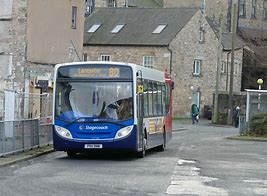May 12th 2020, 15:52
Blog 12th May 2020
In this blog, I discuss the impact of coronavirus on local government finances and local economies; the Supported Bus Services grant and our webinars. I refer to the MHCLG, LGA, Cumbria Chamber of Commerce, the Business Energy and Industrial Parliamentary Select Committee, Department for Transport, Cumbria County Council, Campaign for Better Transport, Housing Association Finance in Scotland and Service Charges.
There are increasing concerns about the financial viability of local authorities in view of the increased service pressures and reduced income caused by the coronavirus pandemic. My conversations with senior councillors and officers in local authorities suggest that there are many councils that are close to issuing section 114 notices (public statements that they are not financially viable). Some are only continuing to operate without section 114 notices because they are making the perhaps heroic assumption that the Ministry for Housing, Communities & Local Government (MHCLG) will provide them with additional resources.
In late March, the MHCLG embarked on a regular survey exercise, asking councils to submit high level returns setting out projected cost pressures, income losses and cash flow issues. They received 329 responses – a 97% response rate – to the April round.
The Local Government Association (LGA) has asked local authorities to share their April survey returns with them. According to a report to the LGAs Resources Board today, they had received over 170 of the MHCLG survey returns from councils. Analysis of those returns suggests the following:
Councils will also face the task of restarting their economies – a significant task. For example, the Cumbria Chamber of Commerce reported the results of a survey of their members to the Business Energy and Industrial Parliamentary Select Committee on 1st May as follows:
Meanwhile, the Department for Transport has been awarding grants to local authorities under their scheme for funding Supported Bus Services during 2020/21. Bus services are obviously important to rural communities including those in Cumbria where I live. The news that Cumbria County Council has been awarded £380,000 is therefore to be welcomed as it will support new bus services such as those between Appleby and Kirkby Stephen and that to connect Kirkby Stephen town centre with the railway station and surrounding villages. People in rural Cumbria should be grateful to officers in the County Council’s transport service for their work in securing this funding.
 A rural bus service
A rural bus service
However, the government is not as generous as first appears. In October 2019, the Campaign for Better Transport reported that local authority bus funding in England has been reduced by £400million (40%) since 2010 causing the loss or reduction of over 3,000 bus services across England including many in Cumbria. This is because central government has reduced local government funding by about 50% over the same period. The government’s Supported Bus Services scheme for 2020/21 provides only £30million across the whole of England so it does little to undo the damage that has already been done across the country.
Cumbria’s share of that £30million is £380,000, slightly less than 80p for each person in Cumbria. While this is welcome it is not enough to provide the bus services that Cumbria needs. Furthermore, the government has been relatively generous to Cumbria, levels of funding in relation to the population are lower in many other counties.
When the Coronavirus crisis is over there will be a need to re-start the economy. In Cumbria and other rural areas improved bus services will be an important part of this. There may be a need to provide funding to retain or restore services let alone improve them especially as there will be a need to maintain social distancing on the buses at least in the short- to medium-term. The challenge of global warming will still need to be addressed and that also requires improved public transport. We need a more ambitious strategy for bus services especially in rural areas.
The Local Government Association (LGA) has already recommended that funding for concessionary fares should be reinstated to 2010/11 levels to stop the pressure on council funding of supported bus services; and that the Bus Services Operators Grant that currently goes to bus operators should be devolved to local authorities so it can be targeted at supporting unviable but socially useful services.
If Cumbria is to keep existing bus services, let alone receive the bus services that it needs, I think the government will have to come up with more than £30million for supported bus services and should also implement the recommendations of the LGA.
Today, I am finalising my preparations for the ‘Introduction to Housing Association Finance in Scotland’ webinars that I will be holding tomorrow, Thursday and next week. They have proved very popular and I am looking forward to meeting the delegates. However, if you would like to join us there are still places available. For further information or to make a booking, please click here.

Houses built by Eildon Housing Association in the Scottish Borders
If you would like more information about any of our webinars, please click here.
If you would like to enquire about future webinars, or would like to suggest any relevant subjects, please e-mail adrian.waite@awics.co.uk or telephone 017683-51498.
Next week I will be starting a series of webinars on service charges. These are designed to be relevant to people in England, Scotland and Wales. There are three webinars. The first is an introduction to service charges; the second looks at how service charges are calculated and de-pooled; and the third looks at the eligibility of service charges for housing benefit and universal credit.
For further information or to make a booking, please click here.
Last week, I published a briefing paper entitled ‘Introduction to Housing Association Finance in Scotland (technical)’. To view or download your copy, please click here.